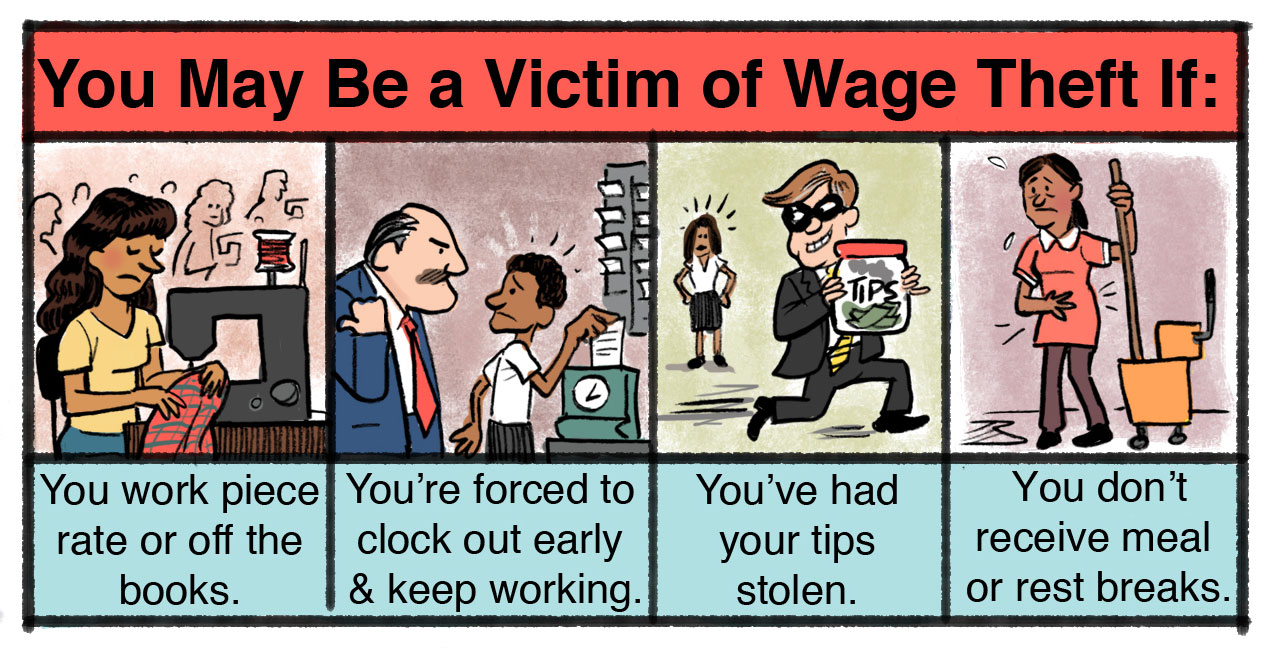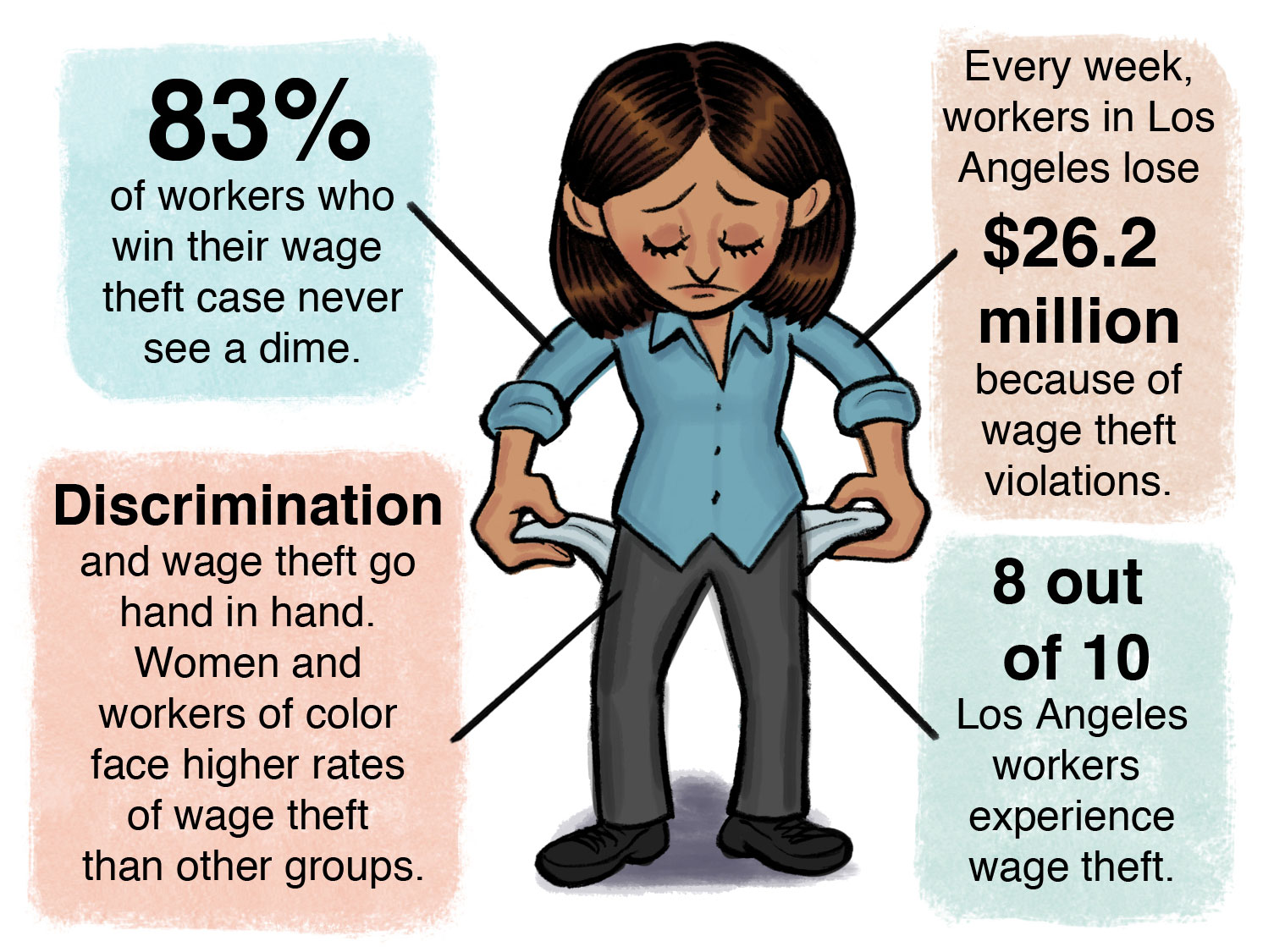
Wage theft is the illegal practice of not paying workers for all of their work including; violating minimum wage laws, not paying overtime, forcing workers to work off the clock, and much more. It is a major problem statewide. In Los Angeles alone, low-wage workers lose $26.2 million in wage theft violations every week–making it the wage theft capital of the country.
Why can’t people just report this and collect?
California has many strong labor laws on the books, but wage theft persists because of lack of enforcement. When workers attempt to report wage theft violations, the process can take years, and businesses often shut down or change names during this time.
The UCLA Labor Center reviewed wage claim data from 2008-2011 and found the majority of companies ruled against by the labor commission and courts never paid back any wages. 83 percent of workers who hold a court-ordered claim to receive their unpaid wages never see a dime.
In the current system it is easy for unscrupulous employers to avoid the consequences of their actions. In fact, employers often close up shop or open up their business under another name to avoid paying their workers.
Wage theft affects families.
Wage theft has huge consequences for workers across industries who are just looking to receive a fair day’s pay for a fair day’s work. Just recently, the Los Angeles Times detailed the stories of 11 workers at a West Los Angeles bakery were paid just two dollars an hour over a two year period. Some of the workers were forced to work 17 hours a day.
Heriberto Zamora worked for one of the most expensive restaurants in the country, Beverly Hills’s acclaimed sushi restaurant Urasawa. Though he worked nearly 60 hours per week and 12-14 hour shifts, he did not receive overtime. When one day, after an eight hour shift, he asked to go home because he was sick, his boss fired him on the spot.
The California Labor Commissioner issued his employer a judgment to pay over $38,000 to Zamora and his coworkers, they found the law did not have teeth and he wasn’t able to collect. He finally received payment, after local organization Koreatown Immigrant Workers Alliance heavily advocated for him.
View more wage theft stories from Los Angeles.
[iframe id=”https://www.youtube.com/embed/SBSLF6Inb-k”]
View NBC’s story about wage theft in the state of California.
New Wage Theft Legislation
Last year, landmark policies passed to help workers receive a fair day’s pay for a fair day’s work. When the Los Angeles City Council voted to raise the city’s minimum wage to $15/hour, it also voted to establish a new Office of Wage Standards to enforce wage and hour violations. In addition, as cities across California raised their minimum wages, nearly all of them established wage theft offices.
On the state level, California passed SB 588, which enacted new tools for the California Labor Commissioner to be able to collect on behalf of workers.
Now, the rubber hits the road. Budget decisions happening now will determine how wage theft enforcement will happen and if it will be efficient and effective.
Research
Hollow Victories: The Crisis in Collecting Unpaid Wages for California’s Workers (2013)
Workers whose employers have failed to pay them face serious challenges in recovering their hard-earned wages. To a worker who has lost hundreds, if not thousands of dollars in unpaid wages, winning a judgment is often at best a hollow victory. Non-payment or underpayment of wages remains rampant nationwide.
Wage Theft and Workplace Violations in Los Angeles (2010)
Drawing on a survey of more than 4,000 workers in low-wage industries in the three largest U.S. cities — Chicago, Los Angeles, and New York — this report focuses on the results for L.A. County. Among its findings, every week in Los Angeles low-wage workers lose $26.2 million dollars in wage theft violations.
Broken Laws, Unprotected Workers (2010)
A landmark survey of 4,387 workers in low-wage industries in the three largest U.S. cities—Chicago, Los Angeles, and New York City.
News Coverage
September 11, 2015 – Los Angeles Times – California Lawmakers Approve Legislation to Combat Wage Theft
September 8, 2015 – KCRW – The Fight for Lost Pay After Years of Wage Theft
September 7, 2015 – KPCC – With Minimum Wage on the Rise, Labor Leaders Focus on Wage Theft
September 4, 2015 – Los Angeles Times – Few Wage Theft Victims Ever Get Their Back Pay
May 1, 2015 – NBC San Diego – Wage Theft: Companies Stealing from Workers in California
April 6, 2015 – Los Angeles Times – Few California Workers Win Back Pay in Wage-Theft Cases
Feb 16, 2015 – NBC Bay Area – California’s Wage Theft Problem




